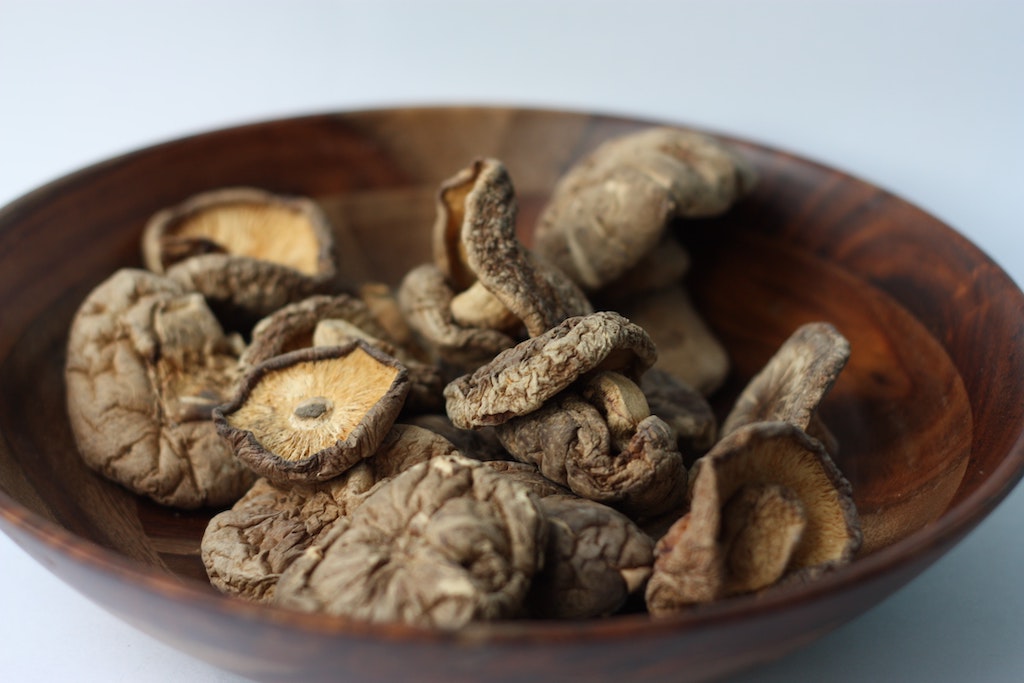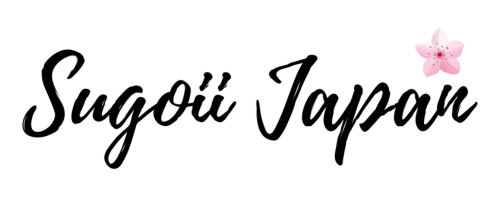The Japanese diet is synonymous around the world as being wholesome, healthy, and delicious. People are often trying to figure out what it is about the diet that allows the Japanese to eat such tasty foods and yet remain mostly trim.
Their secret? A wide variety of foods that make up a super balanced diet. You’ve probably heard of the phrase “everything in moderation”, but whilst most people may find it hard to stick by, it’s ingrained in the Japanese way of life from the day you are born.
The people of Japan have long praised the health benefits of such goods as matcha, tofu, and miso. What many people don’t realise is that the reason why they always seem to enjoy their foods is in large part because of the variety of mushrooms they incorporate into their diet!

Mushrooms have long been a global source of protein for vegans and vegetarians. Not only that, but the varying types of mushrooms that exist means that there’s literally a type of mushroom for every occasion.
The health benefits of mushrooms have proven that they are just as nutritional as they are delicious, possibly even more so!
Honestly, we don’t know anyone who doesn’t love mushrooms, and this article is just to make sure you know that there are way more varieties than you can imagine!
Read on as we detail 8 of the most delicious Japanese mushrooms and why you should eat them.
1. Shiitake Mushrooms

Encompassing an abundance of flavour and nutritional value, the shiitake mushroom is without a doubt the most famous Japanese mushroom. Usually found in Japanese soups and hotpots, tempura batters, and grills, the shiitake mushroom offers a delectable ‘meaty’ texture which makes it a great meat replacement. Its distinct earthy smoky/woody flavour and smell make it an easy centrepiece of any meal.
Whilst this mushroom is extremely popular in Japan, it’s also eaten widely around the world, especially amongst other Asian countries. Shiitake mushrooms can be bought fresh or dried, with the dried version needing some preparation before being cooked.

In terms of underlying health benefits, the shiitake mushroom is exploding with nutrients. Key ones include high levels of vitamin B, vitamin D, phosphorus, and potassium. These key nutrients work to lower cholesterol levels, aid in producing red blood cells and provide antivirus protection.
Order Shiitake Mushrooms Online >>
2. Enoki Mushrooms

Another popular Japanese mushroom that you may have come across before is the enoki mushroom. Unlike most other mushrooms that feature a noticeable stem and flat umbrella top, enoki mushrooms are characterised by their long and slender clustered white stems with a tiny cup top. They’re usually sold by the bunch.

Enoki mushrooms have a light, mild and slightly sweet flavour with a tiny bit of a crunch. They’re normally used in hotpots and soups like nabe and sukiyaki. You will also come across them with either bacon or beef wrapped around them, being grilled at yakitori joints. They’re a popular ingredient not only in Japanese dishes, but also Korean and Chinese cuisine.

Some of the biggest benefits of enoki mushrooms include being super low in calories, fats and they’re basically sugar free. Much like the shiitake mushroom, enoki mushrooms have concentrated levels of vitamin B and D. Aside from that, enoki mushrooms are known for their immunity strengthening and aid in digestive health.
Order Enoki Mushrooms Online >>
3. Maitake Japanese Mushrooms

Maitake mushrooms may look a little intimidating at first, as they don’t take on the usual image of mushrooms. Maitake translate to “dancing mushroom” and grow in bunched-up clusters with overflowing heads that come together almost like a cabbage head.
Unlike enoki, their smell and taste are more distinct, emitting an earthy and smoky flavour and scent. They’re also super soft in texture. Due to this, they are the perfect accompaniments for stir-fries or sautés as well as tempura dishes.

Eating maitake mushrooms is believed to help our bodies fight cancer and treat diabetes II. On top of that, they’re bursting with vitamin C and D, fibre, potassium and copper. They work well to lower blood sugar, boost immune systems as well as assist with weight loss.
Order Maitake Mushrooms Online >>
4. Eryngii Mushrooms (King Oyster)

The king oyster mushroom is indeed the royalty of oyster mushrooms! The sheer size alone is one of its featured characteristics. Eryngii mushrooms are characterised by their large, long and thick white stems with distinct brown caps.
Unlike most mushrooms listed here, eryngii mushrooms are not native to Japan; they were actually introduced in the early 1990s and since then has boomed in popularity.

Eryngii mushrooms lack any distinct smell or flavour when raw, but when it is cooked, it becomes an absolute flavour bomb! Due to its plump texture, it makes for an excellent meat substitute, and is often grilled on skewers, much like a steak. Adding just a simple pinch of butter, salt and pepper will heighten its umami.
The eryngii mushroom is packed full of protein hence why it is a great meat substitute. It can also help control cholesterol levels with the Lovastatin compound. Eryngii mushrooms are high in carbohydrates, vitamin B3 and D, and will assist with reducing the risk of chronic diseases, improve blood flow, and assist with skin issues as well.
5. Buna-Shimeji Mushrooms

Buna-shimeji mushrooms are similar to maitake mushrooms in that they are also grown in clusters. Their stems are usually long, white and firm, and are topped with small brown caps.
When eaten raw (not a common thing), they emit a bitter taste. However, when cooked, buna-shimeji mushrooms lend an earthy, nutty flavour to the dish.

With their firm, slightly crunchy texture and wide availability across Japan, they’re a popular ingredient for almost all dishes. You can expect to find them in soba noodles, stir-fries, hotpots, and even pasta dishes!
Buna-shimeji mushrooms are full of protein, making them a great substitute for meat in vegetarian dishes. Additionally packed with ingredients such as potassium, zinc, vitamin B and C, and copper, buna-shimeji promotes a healthy heart and metabolism, strengthens the immune system, and helps lower cholesterol.
6. Kikurage Mushrooms (Wood Ear)

Kikurage mushrooms are quite the odd-looking mushrooms. Unlike many listed here, kikurage mushrooms don’t have long stems and cap tops. Rather, they grow into shapes resembling ears, are a dark brown colour, and have unusually crunchy textures, much like seaweed.
As it has got quite an unusual look, you may have missed dining on it whilst in Japan; the kikurage mushroom is, in fact, one of the most commonly eaten mushrooms in Japan. A popular methods of consuming it would be as a ramen topping!
Kikurage mushrooms offer a host of health benefits. For example, one serving equates to approximately 80 calories, contains 0 sugar, and has less than 1 gram of fat! This makes it a great ingredient to use for those dieting or looking to maintain their weight.
Aside from that, it also contains an anti-inflammatory effect which can assist with cold symptoms, antioxidants which can help lower cholesterol, and boasts a heap of protein.
7. Matsutake Japanese Mushrooms

Matsutake mushrooms are one of the most valuable mushroom varieties in Japan; in fact, it’s often placed on the same pedestal as truffles!
The main reasons for this, is because they’re extraordinarily difficult to find, they contain a myriad of health benefits for the body, and they have a unique strong spicy smell and taste that you simply cannot find in any other mushroom!
Similar to eryngii mushrooms, matsutake mushrooms are characterised by a white, firm, and thick stem with a brown cap top.

Matsutake is often paired with simple rice to bring out its rich, earthy, spicy flavour. Many Japanese people also love eating matsutake mushrooms as an ingredient in sukiyaki as well. They harvest around autumn in Japan and it is recommended that you eat it as soon as possible.
Matsutake mushrooms are prized for their concentration of copper, which is essential for the production of red blood cells. Additionally, it is known to promote heart health as well as tumor and cancer resistance. It’s also jam-packed with vitamins A, B, and C – that may explain the hefty price tag!
Order Matsusake Mushrooms Online >>
8. Nameko Mushrooms

Nameko translates to slimy mushrooms, but don’t let that turn you off! These mushrooms are coated in a gelatinous texture which actually add to their list of health benefits. They are orange in colour and are characterised by their small steps with a wide umbrella-like cap.
The mild and earthy taste of these mushrooms make them a great ingredient for most Japanese dishes. However, they are most common in soba noodles, hotpots, and stir fries. Due to their gelatinous texture, a slight glaze will form when cooked.

Nameko mushrooms are loaded with vitamin B, potassium and calcium. Eating it is believed to strengthen the immune system, lower cholesterol, and help fight against cancer.
If there’s anything you should take away from reading this, it’s that Japanese mushrooms are delicious, versatile, and super healthy!
—
You’ll find that across the 8 varieties listed here, there’s one for literally every occasion, meaning that’s no reason for you not to include some Japanese mushroom magic into your next meal!
In terms of health benefits, many studies have found that the basic nutritional value of Japanese mushrooms are more than most people think, and so regularly incorporating it into your meals will eventually yield some results!
If you haven’t shopped for them before, be on the lookout for Japanese mushrooms that offer a firm texture, free of any bruises and unwithered. Happy shopping for mushrooms, and we’d love to hear your thoughts on the ones that you’re trying for the first time!
You can also read this article for more healthy Japanese food. And if you want to cook Japanese food at home, make sure to check the product in this blog post: Japanese cookware.

